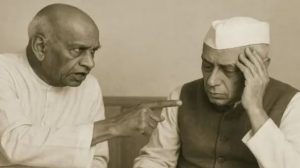National Herald case reignites, Gandhis under ED scanner amid echoes of Sardar Patel’s 1950 warning

New Delhi: The National Herald case, once buried beneath decades of political whitewash in post-Independence India, has once again surged to national attention—this time, shadowed by serious allegations of financial misconduct reaching directly to the Gandhi family’s doorstep.
The Enforcement Directorate (ED) has accused Congress leaders Sonia Gandhi and Rahul Gandhi of orchestrating a covert operation to divert assets worth ₹5,000 crore. The Bharatiya Janata Party (BJP) has called the case a “textbook example” of what it claims is Congress’s entrenched legacy of corruption, entitlement, and dynastic misuse of power.
But the roots of this murky saga trace back far deeper, to 1950, when Sardar Vallabhbhai Patel, India’s first Deputy Prime Minister and widely known as the Iron Man of India, raised alarms over the National Herald’s financial dealings. A series of letters exchanged between Patel and then-Prime Minister Jawaharlal Nehru in May 1950, now documented in the book Sardar Patel’s Correspondence, reveal Patel’s concerns about the newspaper being used for questionable fundraising. He cautioned Nehru against leveraging government influence in such dealings and urged him to avoid accepting funds from dubious sources.
Nehru’s response to Patel’s concern was ambiguous. He claimed ignorance of the transactions and offered only vague assurances of an internal inquiry, reactions that did little to allay Patel’s fears. Critics argue that this early dismissal set a precedent for unaccountability, and the moral compromises warned about then are echoed in the allegations Congress faces today.
Fast forward to the present, and Patel’s warnings seem eerily prophetic. BJP leaders now describe the National Herald case as a multi-crore scam masked as corporate restructuring. Sonia and Rahul Gandhi, through their control of Young Indian Ltd., stand accused of manipulating legal and financial mechanisms to quietly acquire the assets of the defunct National Herald. The ED’s chargesheet suggests this was not financial negligence, but a calculated abuse of political power for personal enrichment.
Patel’s original concerns came to a head May 5, 1950, when he wrote to Nehru expressing alarm over a ₹75,000 donation made to the National Herald by individuals linked to Himalayan Airways. The airline had reportedly secured a government contract despite objections from the Indian Air Force. For Patel, it was a clear case of political favouritism.
He didn’t mince words. Patel noted that one of the donors, Akhani, was facing charges of bank fraud. More concerning was his allegation that Union Minister Ahmed Kidwai was soliciting funds for the paper from controversial businessmen in Lucknow, including J.P. Srivastava.
Nehru responded the same day, claiming he had asked his son-in-law, Feroze Gandhi—then the General Manager of the Herald—to look into the issue. But analysts have since described Nehru’s tone as vague and non-committal.
Undeterred, Patel followed up the next day. In a letter dated May 6, he rebutted Nehru’s deflection and emphasised that many donations had come from private companies without any charitable intent. “There is no element of charity in them,” Patel wrote bluntly.
Nehru again attempted to distance himself, stating that he hadn’t been involved in the paper’s finances for the past three years and had handed over responsibilities to someone named Mridula. While he acknowledged that “some mistakes may have occurred,” he downplayed the issue, calling it a business matter involving “loss and profit,” rather than a question of ethics and accountability.
Senior BJP leader Dr. Subramanian Swamy, the original petitioner in the case, has long maintained that the Gandhis were involved in a “systematic conspiracy” to siphon off public assets. His allegations resonate with the BJP’s broader narrative—that the Congress operates as a family-run enterprise where political power is wielded for personal gain.
While the Congress party insists that the case is a politically motivated vendetta, BJP leaders argue that the historical context—and the ED’s findings—undermine that defence. In this case, they claim, is not just a legal battle but a moral indictment of the Congress party’s long-standing culture of privilege and unaccountability.
By invoking Patel’s 1950 warnings, the BJP aims to draw a sharp contrast between the foundational ethics of India’s early statesmen and the dynastic politics it accuses the Congress of embodying today. The National Herald case, thus, has evolved into more than a legal controversy—it represents a moral reckoning, with far-reaching implications for Indian political accountability.
PNN
News